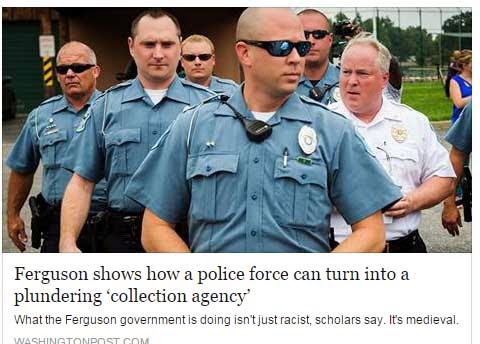Terrence McCoy of the Washington Post has published the latest mis-use of the word medieval, not as a casual pejorative, but as a specific pejorative. He writes:
“The new Department of Justice report depicts a system in Ferguson that is much closer to a racket aimed at squeezing revenue out of its population than a properly working democracy,” wrote George Washington University political scientist Henry Farrell in the Monkey Cage blog, which runs in The Washington Post. Ferguson city employees, from the police chief to the finance director, collaborated to generate revenue through tickets and fees, according to the Justice Department. As described in the report, Farrell and others pointed out, Ferguson is reminiscent of medieval Europe, when gangster governments collected “tribute” and bamboozled the subject population at every turn.
No. There was plenty of internal and external plundering of subject populations in the Middle Ages, but to make this comparison is not only to be confused about medieval community norms, but also – and far more importantly – to mistake what’s happening in Ferguson.
The Ferguson PD plundered a specific racially-defined subset of the population through the use of citation/fine systems, a lack of due process, all supported by white supremacy embodied in the local legal enforcement system. While governments did frequently use fines as regular fund-raising methods in later medieval cities, there the comparison ends.
– The racial issue is wholly modern.
– The “ticket” system to plunder a population is wholly modern.
– Medieval societies were frequently oppressed, but not “bamboozled … at every turn.” Rather, they participated in complex, hierarchical modes of organizing society.
When you share the post, you get this picture and caption.
Notice that “It isn’t just racist, scholars say. It’s medieval.” Now McCoy doesn’t write his captions, but it shows how fast these things can move. Now the “medieval” appellation is being provided by scholars, not the journalist. It’s not what the scholars quoted in the piece say though, although one does use a historical example from early modern Venice:
“Consider the definition of a racketeer as someone who creates a threat and then charges for its reduction,” Tilly wrote, citing how European states first formed during the early 1600s. Venice, for example, was inhabited by both merchants working the ports and a government with questionable motives. “Governments’ provision of protection, by this standard, often qualifies as racketeering,” he wrote.
Venice in 1600 isn’t medieval, for starters. Certainly urban governments often do what they can to extract wealth from their citizens and from outsiders, as possible, often in predatory ways. This happened in early modern Venice and plenty of other cities in other eras.
But to focus on racketeering and protection is, again, to exclude the specific white supremacy aspects of the department and the system. This is how white supremacy replicates itself in a post-slavery, post-Jim Crow, society.
And while the Middle Ages are filled with things both terrible and glorious, white supremacy is not one of them.
I’ve said this before about the use of “medieval” for ISIS. The appellation of “medieval” to modern things that we don’t like imposes distance between us (good people living now) and them (bad people living now / bad people living in the past). It excuses and excludes us from culpability for our present.
The Ferguson PD is modern. It takes modern policing, modern racism, modern judicial systems, modern urban environments, decades of predatory housing policies, white flight, and so much more to make the Ferguson PD. History can help us understand what’s going on here. But the solutions, and the blame, need to focus explicitly on this moment.

(Carrying this over from Twitter.)
You're right. That this situation is distinct, both in terms of the self-ratchetting ticket system (which smacks of distinctly industrialist or post-industrialist alienation) and of the way race is at work (not that, for example, Jewish populations weren't unfairly subjected to laws and protection rackets). And ultimately, I think you're making an important point about the way we're culturally using "medieval" as a way of putting things down.
But the part of me that loves hyperextending metaphor also wants to dig into ways that the current system does resemble Medieval and Early Modern European setups, and how that might show that we haven't progressed quite as far or as directly as we want to presume. I even suspect that there are a few aspects of Medieval Europe that would come off looking better in the comparison.
*Medieval* Jewish populations, that is.
Thanks Erik. I'm always happy to resist modern = good positivist narratives. I just don't think that's the specific effect of this article. But I'll ponder that as a potential use for "medieval'
metaphors.
I keep crying in the wilderness but most people prefer to put cruel and horrific behavior in the past and any occasion of it now is just recidivism. Still, keep up the good fight. See you next month. Sharan